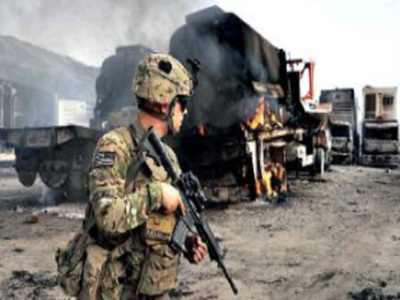- News
- World News
- US News
- US-Taliban deal could leave Indian infra in Afghanistan vulnerable
Trending
This story is from February 22, 2020
US-Taliban deal could leave Indian infra in Afghanistan vulnerable

For the past decade, Indian policymakers and security leadership have anticipated a withdrawal of US troops from Afghanistan, and what that would mean for India. The world now has a date. On Friday, the US and Taliban, in coordinated statements, announced that the two sides would sign a peace agreement on February 29.
The peace deal is expected to kick off two processes — a phased withdrawal of US troops and an ‘intra-Afghan’ dialogue.The first test will be a “significant reduction in violence” across Afghanistan. “Intra-Afghan negotiations will start soon thereafter, and will build on this fundamental step to deliver a comprehensive and permanent ceasefire and the future political roadmap for Afghanistan. The only way to achieve a sustainable peace in Afghanistan is for Afghans to come together and agree on the way forward,” US secretary of state Mike Pompeo said.
Afghanistan and its future will now be an important element in the talks the Indian leadership will have with US President Donald Trump and his cabinet next week. India will be interested in the timeline of US withdrawal as well as the details of a security/counter-terrorism presence the US may have in Afghanistan.
Tilak Devasher, formerly with RAW, said, “India’s interest is to secure the investments we have made in Afghanistan in the past two decades, and the security of our diplomats, personnel and missions. In addition, we would be wary of ungoverned spaces in that country, which could become grounds for terror groups to flourish. Of particular concern would be the prospect that Pakistan could use any such spaces to move its anti-India terror infrastructure, groups like LeT and JeM from Pakistan.”
Former ambassador to
The Afghan election results were just made public after months, giving Ashraf Ghani another victory. The results have been rejected by opponent Abdullah Abdullah and others. Neither the US nor Pakistan have congratulated Ghani, only India and the EU have. It’s no secret that the Taliban does not consider the Kabul government to be legitimate. This not only places Ghani and his government in an uncertain position, it could allow the Taliban to pick off the different groups and oust Ghani in the foreseeable future. In an oped, Sirajuddin Haqqani, deputy leader of the Taliban and head of the dreaded Haqqani Network, emphasised a “new Afghanistan”. The contours of that will be watched warily from India.
The peace deal is expected to kick off two processes — a phased withdrawal of US troops and an ‘intra-Afghan’ dialogue.The first test will be a “significant reduction in violence” across Afghanistan. “Intra-Afghan negotiations will start soon thereafter, and will build on this fundamental step to deliver a comprehensive and permanent ceasefire and the future political roadmap for Afghanistan. The only way to achieve a sustainable peace in Afghanistan is for Afghans to come together and agree on the way forward,” US secretary of state Mike Pompeo said.
Afghanistan and its future will now be an important element in the talks the Indian leadership will have with US President Donald Trump and his cabinet next week. India will be interested in the timeline of US withdrawal as well as the details of a security/counter-terrorism presence the US may have in Afghanistan.
Tilak Devasher, formerly with RAW, said, “India’s interest is to secure the investments we have made in Afghanistan in the past two decades, and the security of our diplomats, personnel and missions. In addition, we would be wary of ungoverned spaces in that country, which could become grounds for terror groups to flourish. Of particular concern would be the prospect that Pakistan could use any such spaces to move its anti-India terror infrastructure, groups like LeT and JeM from Pakistan.”
In a sense, the peace deal could be a victory of sorts for Pakistan, which has been Taliban’s principal supporter for ever. Pakistan has been pressured by US to bring the Taliban to the negotiating table and prima facie, it has delivered. It is significant, therefore, that despite Pakistan’s importance in getting this deal together, it could not stay off the FATF grey list, which PM Imran Khan had desperately wanted.
Former ambassador to
Afghanistan Gautam Mukhopadhyaya said, “For the sake of peace that Afghans desperately want after decades of war and terrorism, any opportunity for inter-Afghan talks should be welcomed and given a chance. But Afghans will be entering such talks with the US repositioned as a facilitator rather than strategic political and military partner, and neither the Afghans nor we should be under any illusions that the decks are stacked against it. The Afghans need all the political support from the international community.”
The Afghan election results were just made public after months, giving Ashraf Ghani another victory. The results have been rejected by opponent Abdullah Abdullah and others. Neither the US nor Pakistan have congratulated Ghani, only India and the EU have. It’s no secret that the Taliban does not consider the Kabul government to be legitimate. This not only places Ghani and his government in an uncertain position, it could allow the Taliban to pick off the different groups and oust Ghani in the foreseeable future. In an oped, Sirajuddin Haqqani, deputy leader of the Taliban and head of the dreaded Haqqani Network, emphasised a “new Afghanistan”. The contours of that will be watched warily from India.
End of Article
FOLLOW US ON SOCIAL MEDIA










